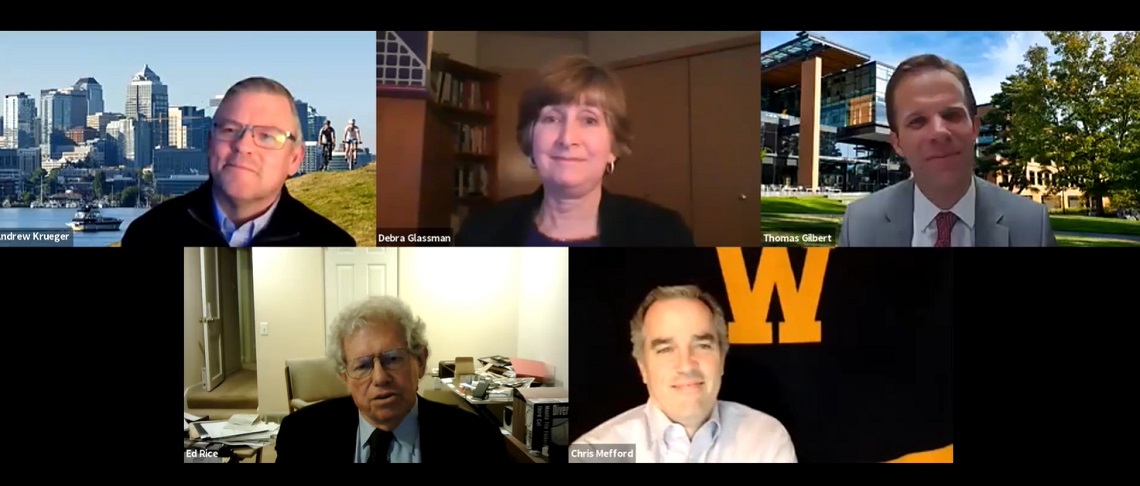the Informer
Chris Mefford’s Community Attributes turns disparate data into objective economic intelligence
At the onset of the COVID-19 pandemic, the Seattle Chamber of Commerce commissioned Chris Mefford (MBA 2002) and his team at Community Attributes Inc. to analyze the regional economic impact of the outbreak.
Mefford and his team did just that. The report he submitted was not a pretty picture. Two months after, Mefford opened the Foster School’s 20th annual State of the Economy Forum and spoke about the process.
“It was a really humbling and sobering exercise as the virus went from being speculative to real. At the end of the paper, we faced some flack. People criticized us for being too negative. For not thinking in optimistic terms,” says Mefford.
“When you go back and read that report today, it reads as plain as the nose on your face. All of our worst concerns and worst fears about the economic impact of the virus have come to pass.”
A beer with every book
Twenty-six years before COVID-19 wreaked havoc on the economy, Mefford earned his MS in urban and regional planning from the University of Iowa, a “yes,” from his now-wife Heather—now an associate professor of pediatrics at the UW and attending physician at Seattle Children’s Hospital’s Genetic Medicine Clinic—and headed to Seattle.
After working on regional transportation for a number of years, Mefford found himself wanting to improve his business knowledge. The spark to act on it was provided by his friend Tod McBryan (MBA 2002).
The two entered Foster’s Evening MBA Program in the fall of 1999 with two rules. First, to remind themselves it was done on their own initiative and their own volition. “We didn’t want to ever complain about coursework,” says Mefford.
Second, when the two studied together, they opened a beer before they opened a textbook. “Those were three very informative, very fun years.”
It was during the fun that he wrote a business plan for Mefford Consulting Services.

The deciding vote
One could argue that business plan made Mefford one of the most influential people in Washington state. He would humbly deny it. Yet, consider his reach since launching Community Attributes.
His client list includes 30+ cities in Washington, including Seattle, Spokane Valley, Wenatchee and Vancouver. It includes the Washington State Departments of Agriculture, Commerce and Revenue, to name a few, and multiple counties. Add the non-profit and private sectors (Bill & Melinda Gates Foundation, Washington Technology Industry Association, Amazon, Comcast), and the picture begins to take shape.
Consider the City of Seattle’s contentious decision regarding a new NBA arena. One of the proposals, led by entrepreneur Chris Hansen, would have vacated Occidental Street—a small but busy channel through Seattle’s industrial district. “I believe we were a deciding factor in keeping Hansen’s NBA arena from happening,” says Mefford
The Community Attributes analysis focused on the importance of the street to freight mobility from the port of Seattle and the jobs tied to it.
“There are nine members on the Council. The first eight had voted. It was a tie. The last council member, Debora Juarez, referenced our memo. And then she voted no. People had different opinions about the outcome, but I believe our analysis was objective, data-driven and transparent.”
Ziglar says
As a kid, Mefford went to Zig Ziglar seminars with his dad, who taught sales and marketing at a community college. The experiences had an impact.
“If people like you, they’ll listen to you,” Ziglar famously said, “but if they trust you, they’ll do business with you.”
“We try to be objective,” says Mefford. “If anybody accuses us of bias, then we defend that with transparency and say, ‘These are the assumptions that we made; if you have a better assumption, then let us know.’ ”
It’s the type of approach that builds trust. What better quality could an organization want from someone informing their decision making?
